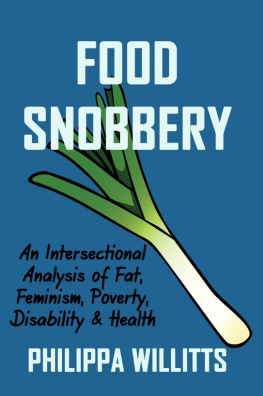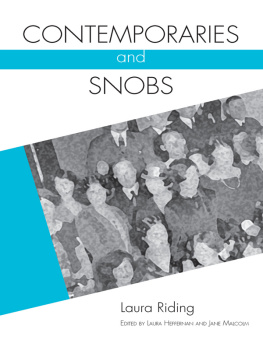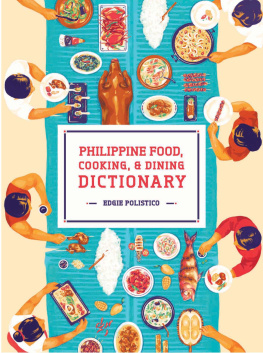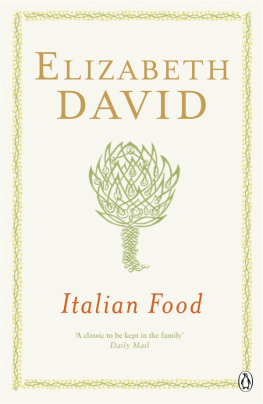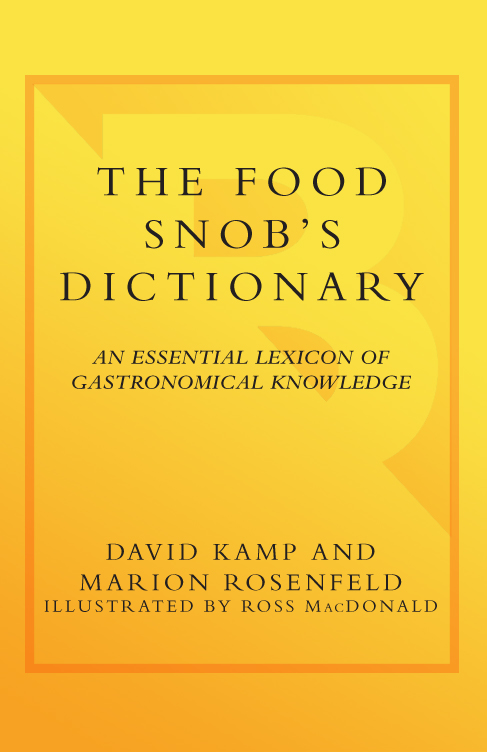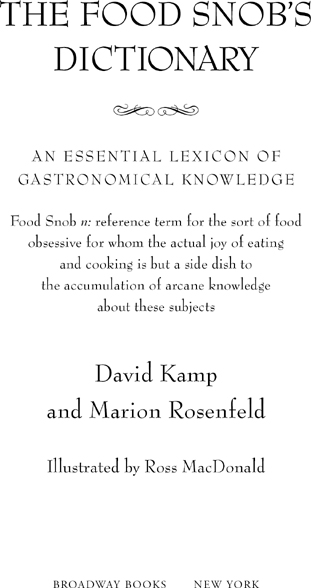Also by David Kamp
The United States of Arugula
The Film Snobs Dictionarywith Lawrence Levi
The Rock Snobs Dictionarywith Steven Daly
Contents
Acknowledgments
The authors wish to thank Aime Bell, Thomas Jones, Graydon Carter, Dana Brown, Norman and Lee Rosenfeld, Peter Kaminsky, Adam Platt, Clark Wolf, David Lynch, Josh Sens, Joan Feeney, Rob Kaufelt, Nina Planck, Charles Conrad, Jenna Thompson, Steve Rubin, Suzanne Gluck, Georgia Cool, and the merchants of the Ferry Building Marketplace in San Francisco and the Greenmarket in New Yorks Union Square. May your peaches be strictly seasonal, and your jamon always Ibrico.

An Introductory Note by the Authors
Part groupie, part aesthete, part stark raving loon, the Food Snob is someone who has taken the amateur epicures admirable zeal for eating and cooking well to hollandaise-curdling extremes. He wears Bastad chefs clogs even though he works in publishing or property law. He owns an $8,000 gas range with six burners and a griddle. Hes collected the cookbooks not only of James Beards first-tier protgs, Marion Cunningham and Barbara Kafka, but also of the all-but-forgotten second-tierers John Clancy, Felipe Rojas-Lombardi, and Maurice Moore-Betty. He makes his own stocks, has taken a night course in mycology so that he may forage his own mushrooms, casually alludes to the sugar work he performed in the course of whipping up his famous homemade Christmas confectionery, and bakes rustic sourdough loaves daily from the pain au levain starter hes had going since 1996.
In other words, he has gone to great lengths to distinguish himself from you, the mere food enthusiast, for whom watching Giada De Laurentiis on TV and cooking Mark Bittmans Basic Pot Roast are kinda fun. Whereas you favor potatoes and onions, he traffics in celeriac and garlic scapes. Whereas youre keen on Granny Smiths, he insists that you havent even tasted an apple until youve sampled a Newtown Pippin. Whereas you regard your outdoor gas grill as just wonderful, he grills only with fruitwoods and mesquite, brushing the coals with moistened grapevine cuttings when available. He considers Elizabeth David, Richard Olney, and Fernand Point his greatest influences, in particular the latters masterful Ma Gastronomie, in the original French, whichWhats that? You dont know who these people are? Then then shame on you!
The Food Snobs Dictionary has been developed to function as both a defensive aid in dealing with such a person and as a primer for aspiring Snobs who wish to lord their knowledge over others. In either case, it will help you keep romesco straight from romanesco, which, on rough days, is difficult even for chefs.
Theoretically, the Food Snobs body of knowledge should be vast, bordering on infinite. Human beings have been cooking and eating since time immemorial, which means that the Food Snob should have much more turf to cover and act smug about than, say, the Rock Snob or the Film Snob, whose chosen fields of specialized orneriness have relatively short But the good news is that Food Snobbery in its modern form is a relatively recent pathology, with a very manageable history and vocabulary. Only academics and kooks need concern themselves with ancient flatbread preparations and how the Byzantines manufactured the fermented-fish condiment known as garum. For the rest of us, this book will do.
A Brief History of Modern Food Snobbery
In the United States, Food Snobbery as we know it dates only to the period after World War II, when GIs returned to America besotted with French culture, and Americans visiting France as tourists found a populace that, in gratitude for the war effort, restrained its urge to condescend to its guests, instead graciously initiating them into the ways of its culinary riches.
Prior to that watershed moment, Americans were insufficiently curious about food to become Food Snobs. The Gilded Age produced a rash of robber barons who patronized the fanciest dining palaces in the big cities (such as Delmonicos in New York and Locke-Ober in Boston), but these gourmands were by nature vulgar and undiscriminating, pitchforking every variety of viand, oyster, langoustine, game bird, aquatic turtle, and sweetmeat down their gullets with scant consideration of the quality of what they were eating; for all but a few connoisseurs (see entry for BEEBE, LUCIUS), the sheer quantity and expense of what one ate were proof enough of ones social eminence.
But with the postwar emergence of a prosperous, Francophilic middle class in America, both fancy cooking and restaurant-going emerged as leisure activities. Julia Childs first flush of popularity in the early 1960s alerted Americans to the fact that it was possible, if one had thirty-six hours of ones life to set aside, to prepare at home a Mousseline de poisson, Blanche Neigea molded fish mousse adorned with shellfish and covered with sauce chaud-froid, a gelatinous reduction of heavy cream, fish stock, and tarragon, applied in a succession of layers that had to chill and set before the next layer could be spooned on. Concurrently, an enterprising Californian named Chuck Williams was building up a kitchenwares empire called Williams-Sonoma in whose stores one could purchase copper colanders and specialized pastry molds without the inconvenience of hand-toting them from Paris and clearing them through customs. And Craig Claiborne began writing thoughtful, carefully evaluative restaurant reviews in the New York Times, read by millions, in which he actually mentioned the names of the chef and proprietor of the place he was critiquing. Crucially, he also assigned each restaurant a star rating, which was then a novelty.
For sane, well-adjusted people, these developments were embraced in a spirit of joy and good fun. But for a certain, less stable segment of the population, the starting gun had sounded on a new social competition: Who could be the Food-Snobbiest? In this group, it became a mark of status to know the difference between a daube and a navarin (the former is made with slow-cooked beef, the latter with slow-cooked lamb), to know how to prepare both dishes, and to know not only that Craig (the last name never uttered) had praised the daube at a Manhattan bistro called Le Poulailler, but that le poulallier means the chicken coop, and that the bistros owners were Robert Meyzen and Fred Decr, who also owned the more upscale restaurant La Caravelle, and who had previously worked at Le Pavillon, where their employer was Henri Soul, who had made his name running the restaurant of the French Pavilion at the 193940 Worlds Fair and who had before that managed the Caf de Paris in France, and who, as a young man, had waited on Escoffier, the founding father of classical French cuisine, unless, of course, you chose to bestow that honorific upon Carme, who worked for Talleyrand.
By the 1970s and 80s, Food Snobs had moved beyond France as their primary focus of interest. Paradoxically, this only made them snootier. Whether they were exulting in the superiority of Northern Californias produce, baking hippie whole-grain health loaves, grinding their own coffee beans (Sulawesi, Sumatra, or Kona, depending on the hour of the day), or demonstrating that they had evolved beyond outmoded red-sauce perceptions of Italian cookery by making pesto and redoing their kitchens with Tuscan terra-cotta tile flooring, Food Snobs were broadening their repertoires, forever looking for new arenas in which to showboat. At the same time, food journalism became more conversational and knowing, with such magazine writers as Gael Greene (at



